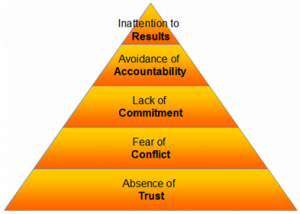5 dysfunctions of a team

Some 5 years back, I came across a business management book that would change the way I would approach football team management on a personal level.
There are plenty of resources for actual coaching of tactics, principles of play etc, but there is very little out there that will help you to get your players to gel, to get on with one another and find that little bit of magic that turns a group of players into a team.
In LAX airport I picked up a copy of Patrick Lencioni’s “5 Dysfunctions of a Team”, by the time a touched back down in Hong Kong I had a new approach to the teams I was coaching and to be honest, many people that I had any kind of working relationship with.
In his book, Patrick Lencioni outlines 5 dysfunctions and then the methods of righting those wrongs, to create a harmonious, productive team. You can see what these are from the pyramid image above, working from bottom to top.
Let me simply summarize this for you now.
Members of teams with an absence of trust…
- Conceal their weaknesses and mistakes from one another
- Hesitate to ask for help or provide constructive feedback
- Hesitate to offer help outside their own areas of responsibility
- Jump to conclusions about the intentions and aptitudes of others without attempting to clarify them
- Fail to recognize and tap into one another’s skills and experiences
- Waste time and energy managing their behaviors for effect
- Hold grudges
- Dread meetings and find reasons to avoid spending time together
Member of trusting teams …
Admit weaknesses and mistakes
Ask for help
Take risks in offering feedback and assistance
Appreciate and tap into one another’s skills and experiences
Focus time and energy on important issues, not politics
Offer and accept apologies without hesitation
Look forward to meetings and other opportunities to work as a group
Overcoming the absence of trust …
Personal histories exercise
Team effectiveness exercise
Personality and behavioural presence profile
360 degree feed back
Leader role
Teams that fear conflict…
- Have boring meetings
- Create environments where back-channel politics and personal attacks thrive
- Ignore controversial topics that are critical to team success
- Fail to tap into all the opinions and perspectives of team members
- Waste time and energy with posturing and interpersonal risk management
Teams that engage in conflict …
Have lively, interesting meetings
Extract and exploit the ideas of all team members
Solve real problems quickly
Minimize politics
Put critical topics on the table for discussion
Overcoming Fear of Conflict …
Acknowledge that conflict is productive, and that many tend to avoid it.
Team Members must occaisionally assume the role of a “minor of conflict”
(someone who extracts disagreements in the team to sheds light on them.)
Team members need to coach one another not to retreat from healthy debate. Remind them what they are doing is necessary.
A team that fails to commit…
- Creates ambiguity among the team about direction and priorities
- Watches windows of opportunity close due to excessive analysis and unnecessary delay
- Breeds lack of confidence and fear of failure
- Revisits discussions and decisions again and again
- Encourages second-guessing among team members
Teams that are committed …
Have clear directions and priorities
Are aligned around objectives
Develop an ability to learn from mistakes
Seize opportunities before the competition
Moves forward without hesitation
Changes direction without hesitation or guilt
Overcoming lack of commitment …
reformulate action plan
Set and honor deadlines, including interim milestones
Worst case scenario analysis to remove the fear from mistakes
practice quick decision making with limited analysis
A team that avoids accountability…
- Creates resentment among team members who have different standards of performance
- Encourages mediocrity
- Misses deadlines and key deliver-ables
- Places an undue burden on the team leader as the sole source of discipline
Teams that are accountable…
Ensure that poor performers feel pressure to improve
Identify quickly problem by questioning one’s approach without hesitation
Establish respect among the team who are held to the same standard
Avoid excessive bureaucracy around performance management and corrective action
Overcoming avoidance of Accountability …
Publication of goals and standards: no one can ignore them and we know who is responsible for what
Progressive review : team members should comment on their peer performance against objectives and standards
Reward team instead of individuals
Do not relegate accountability to consensus approach: shared team responsibility with individual responsibility
A team that is not focused on results…
- Stagnates/fails to grow
- Rarely defeats competitors
- Loses achievement-oriented employees
- Encourages team members to focus on their own careers and individual goals
- Is easily distracted
A team that focuses on collective results …
retains achievement-orientated employees
minimizes individualistic behaviours
enjoys success and failure acutely
has individuals who subjugate their own goals for the good of the team
avoids distraction
Overcoming inattention to results …
public declaration
the team must make results clear
have results based awards
reward only those behaviors and actions that contribute to those results.
They must be careful not to get sidetracked to tangential action items.
Teamwork ultimately comes down to practicing a small set of principles over a long period of time. Success is not a matter of mastering subtle, sophisticated theory, but rather of embracing common sense with uncommon levels of discipline and persistence.









